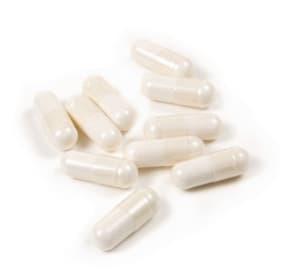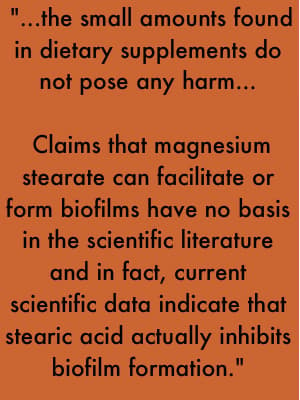
Friends, it seems every few months the topic of magnesium stearate pops up and the cycle of controversy begins anew. So today I’d like to take a moment to address the issue head on.
We receive many concerned calls from folks wanting an honest answer about whether or not magnesium stearate is unsafe. The fear and concern is spurred, unfortunately, by misinformation that is spread by marketers simply wishing to differentiate their (much higher priced) products...not on scientific fact.
What Is Magnesium Stearate and Why Use It in Supplements?
 Magnesium stearate is an important ingredient in the manufacturing of dietary supplements. It serves as a filler and flow agent that helps producers maintain ingredients in a proper form for handling, and it prevents material from adhering to manufacturing equipment.
Magnesium stearate is an important ingredient in the manufacturing of dietary supplements. It serves as a filler and flow agent that helps producers maintain ingredients in a proper form for handling, and it prevents material from adhering to manufacturing equipment.
There are few, if any, acceptable substitutes in most cases. I feel confident in the quality and safety of our supplements produced with magnesium stearate because of the evidence I’ve seen and will share with you below.
To start, I would simply like to paraphrase Dr. Ray Sahelian, who has posted an excellent and well laid out response to this topic. He clearly states that "there is no scientific evidence behind the claims that magnesium stearate in supplements is harmful."
What Does the Scientific Literature Say about Magnesium Stearate Safety?
Unfortunately, the fear over magnesium stearate has only intensified, so we at Swanson Health Products commissioned a report by an independent, board-certified toxicologist to explore the issue and focus on what the real scientific literature has to say.
Before we get to the findings (which are clear and definitive), I’d like to clearly lay out the credentials of the third party expert, Dr. Eric W. Austin, who completed this study while working at Veritox, Inc., "a privately owned corporation that provides consulting services in industrial hygiene, human and environmental toxicology, medical toxicology, risk assessment, and preventive, occupational, and emergency medicine."
 B.S. in Microbiology from the University of California at Los Angeles
B.S. in Microbiology from the University of California at Los Angeles- Ph.D. in Pharmacology and Toxicology from Washington State University
- Diplomate, American Board of Toxicology
- Member of the Society of Toxicology
- Member of the American Society of Pharmacology and Experimental Therapeutics
- Member of the American College of Toxicology
- Member of the International Society for the Study of Xenobiotics
- Published in: Toxicology, Fundamental and Applied Toxicology, Journal of Toxicology and Environmental Health
Debunking the Two Main Arguments against Magnesium Stearate
1. Magnesium stearate is harmful and blocks the absorption of nutrients.
 Magnesium Stearate is the magnesium salt of stearic acid, a long-chain saturated fatty acid unique in that it is the only saturated fatty acid that does not increase blood cholesterol or LDL. Stearic acid is found naturally in meat, poultry, fish, grains, cocoa butter and milk products.
Magnesium Stearate is the magnesium salt of stearic acid, a long-chain saturated fatty acid unique in that it is the only saturated fatty acid that does not increase blood cholesterol or LDL. Stearic acid is found naturally in meat, poultry, fish, grains, cocoa butter and milk products.
While some supplements may contain up to 20 mg of stearic acid (as magnesium stearate), this is, in reality, a very low amount compared to the 5 grams (5,000 mg) that can be found in a single common chocolate bar.
We learned from the report that toxicity data available for magnesium stearate and stearic acid is actually sparse. Why? Because as a food substance it is essentially nontoxic, and therefore there has been limited attention paid to the risks, if any, with its consumption considering that it makes up a substantial portion of the normal human diet.
The limited data did find, however, that toxicity concerns are present with “extraordinarily high levels of consumption.” In other words, the small amounts found in dietary supplements do not pose any harm.
In regards to blocking absorption of nutrients, part of the answer is below, but here’s a quick synopsis from the report:
“...the absorption, distribution, and disposition characteristics [of magnesium stearate] were reviewed. Stearic acid is the most poorly absorbed of the fatty acids commonly found in the diet and therefore less likely to interfere with food uptake in the gastrointestinal tract.”
2. Magnesium stearate creates a biofilm or “glazing” during digestion, blocking the healthful benefits of vitamins, minerals and other nutrients.
I understand the concern here—a valid concern as we all want our vitamins, supplements and even doctor-prescribed medications to be as effective as we expect. I’m not sure I can respond to this argument any more clearly than what our report had to say...again, based on the scientific literature...
From the report:
“Claims that magnesium stearate can facilitate or form biofilms have no basis in the scientific literature and in fact, current scientific data indicate that stearic acid actually inhibits biofilm formation. In a typical diet (food, nutritional supplements, medications), magnesium stearate does not produce biofilms or “glazing,” nor does it impair nutrient absorption in the human stomach or gastrointestinal system.”
My Conclusion about Magnesium Stearate Dangers & Safety Concerns
The bottom line is there is no evidence that magnesium stearate or stearic acid pose any risk to human health; and while you may find up to 20 mg in a supplement, this is nowhere near the “extraordinarily high amount” required before any potential harm may come... or even close to the level found in common foods like chocolate (remember, just one bar can contain up to 5 GRAMS).
However, we here at Swanson Health Products believe very strongly in giving our customers as many options as possible. It's why we've expanded our selection greatly over the past couple of years.
It's why we've created unique categories for speciality diets that make it easier to shop for gluten-free products, organic products, Kosher products, etc. And it's why we carry many brands and products that are manufactured without magnesium stearate if that is your desire.
We give you as many choices as we can, and we're working day after day to continue offering new products based on the lastest science and research. In truth, with over 15,000 products and growing, about the only thing we don't offer a choice on is product safety.
As a Registered GMP Facility by NSF, product quality is our highest priority. The products we sell are tested again and again for purity and potency before they ever get out the door, and we firmly stand behind them.
So I encourage you to read some of the medical literature and resources listed below and to do your own research into the scientific data. Don’t let alarmist, unscrupulous marketers fool you with claims that find no basis in science.
As always, I wish you the very best of health,
Lee Swanson
Additional Resources on Magnesium Stearate Safety:
Note: The following quotes represent the independent opinions of a few well-known natural health leaders. These individuals are not affiliated with nor endorse Swanson Health Products.

Dr. Ray Sahelian
"I, personally, would question the medical acumen of any nutritionist or doctor who claims this substance poses a danger."

Mike Adams, The Health Ranger
"I don't mind flow agents if they're natural and the body can recognize them as food. There are lots of high-quality supplements available today that still use small amounts of stearates, silica or other such ingredients."

Andrew W. Saul
"Some tableting ingredients are pretty standard, such as magnesium stearate or stearic acid, sodium citrate, dicalcium phosphate, cellulose and silica. I consider these harmless fillers to be "natural enough" for me."
 Byron J. Richards
Byron J. Richards
"Bad mouthing magnesium stearate is nothing more than a sales pitch. It is extremely irresponsible."
Thorne Research - Video Against Magnesium Stearate
Metagenics, Inc - Response to Thorne Research's Video
C&EN - Chemical & Engineering News: Science & Technology - Excipients
Sources used in the third-party toxicologist review:
- U.S. Department of Agriculture, Agricultural Research Service, 2006. USDA Nutrient Database for Standard Reference, Release 19. Nutrient Data Laboratory home page, http://www.ars.usda.gov/ba/bhnrc/ndl
- Kris-Etherton, P.M. et. al. “Dietary Stearic Acid and Risk of Cardiovascular Disease: intake, sources, digestion, and absorption,” Lipids. 2005, Vol. 40: 1193-1200
- National Cattlemen’s Beef Association “Stearic Acid: A Unique Saturated Fat” http://www.beefnutrition.org/uDocs/stearic_acid_fs_r1.pdf
- Wellness Resources, Richards, Byron “The Facts on Magnesium Stearate” 8 April 2009 http://www.wellnessresources.com/health/articles/the_facts_on_magnesium_stearate
- “Frequently Asked Questions about GRAS” http://www.cfsan.fda.gov/~dms/grasguid.html
- Code of Federal Regulations, Title 21, Volume 3, Revised as of April 1, 2008 From the U.S. Government Printing Office via GPO Access, page 536-537 http://www.gpoaccess.gov/dfr/retrieve.html
- Sondergaard, D. et. al. “Magnesium Stearate given perorally to rats. A short term study,” Toxicology. 1980, Vol 17: 51-55
- “Final Report on the Safety Assessment of Oleic Acid, Lauric Acid, Palmitic Acid, Myristic Acid, and Stearic Acid,” Journal of the American College of Toxicology. Vol 6(3): 321-401
- Soni, K.A., et. al. “Identification of Ground Beef-Derived Fatty Acid Inhibitors of Autoinducer-2-Based Cell Signaling” Journal of Food Protection. Vol 71(1) 134-138
- U.S. Department of Agriculture, Agricultural Research Service, 2006. USDA Nutrient Database for Standard Reference, Release 19. Nutrient Data Laboratory home page, http://www.ars.usda.gov/ba/bhnrc/ndl




